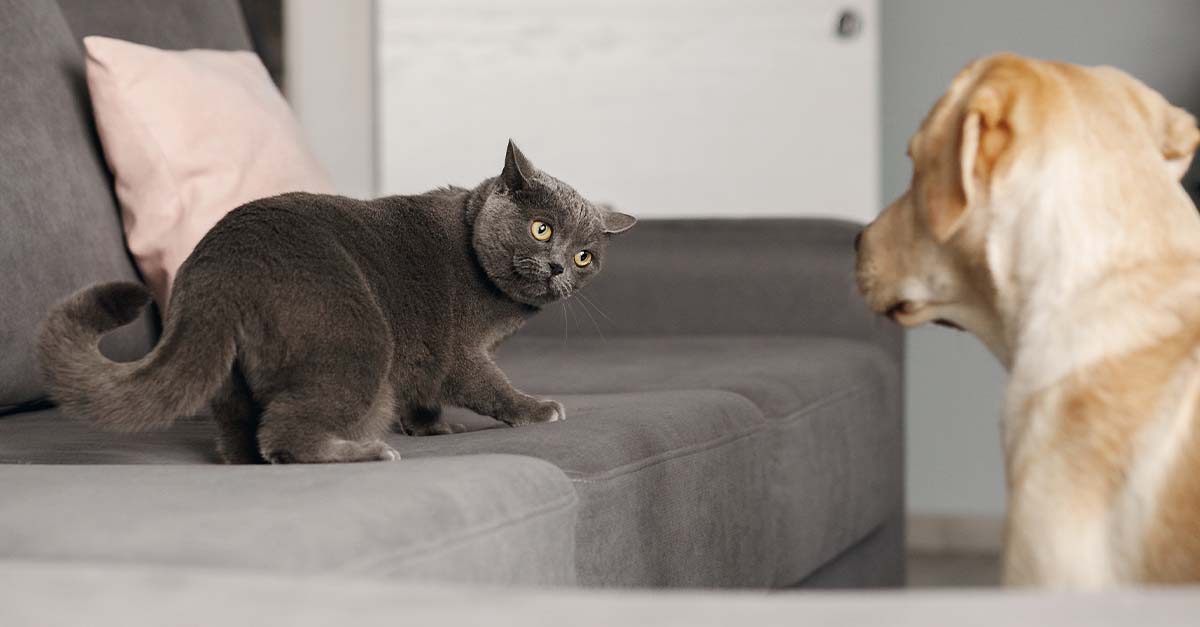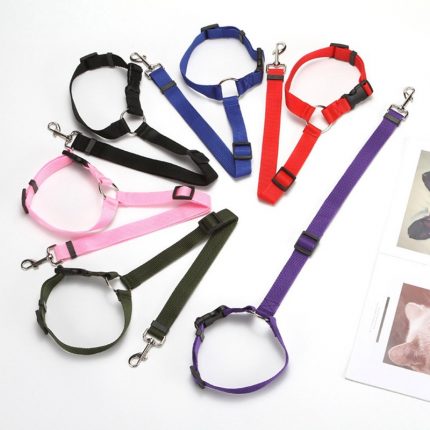Why Does My Dog Hate Cats?
For many pet owners, the coexistence of dogs and cats in the same household can be a challenging and often perplexing situation. While some dogs and cats develop strong bonds and become the best of friends, there are instances where dogs display a clear aversion or even hatred towards their feline counterparts. This raises the question: why does my dog hate cats?
Understanding the underlying reasons behind this animosity is crucial in order to create a harmonious environment for both pets and their owners. In this article, we will explore some of the common factors that contribute to a dog’s dislike for cats, shedding light on their instincts, past experiences, and individual personalities.
Dogs, as descendants of wolves, possess strong predatory instincts. These instincts are deeply ingrained in their DNA and can manifest in various behaviors, including chasing and hunting. Cats, with their quick and agile movements, can trigger these predatory instincts in dogs, leading to aggression or fear. It is important to remember that this instinctual response does not necessarily reflect a personal dislike for cats, but rather a natural response to a potential prey.
Another factor that may contribute to a dog’s aversion towards cats is negative past experiences. If a dog has had a traumatic encounter with a cat in the past, such as being scratched or attacked, it can create a lasting impression and lead to fear or aggression towards cats in general. These negative experiences can shape a dog’s perception and influence their behavior towards cats, even if the initial incident was isolated.

Just like humans, dogs have their own unique personalities and preferences. Some dogs may simply have a natural inclination towards certain animals, while others may have been raised in an environment that did not expose them to cats, leading to unfamiliarity and discomfort. Additionally, factors such as breed characteristics, socialization, and temperament can also play a role in a dog’s compatibility with cats.
While it can be disheartening to witness a dog’s dislike towards cats, it is important to approach the situation with understanding and patience. Recognizing the instincts, past experiences, and individual personalities that contribute to this animosity can help pet owners navigate this complex dynamic and work towards fostering a peaceful coexistence between their dog and cat. In the following sections, we will provide practical recommendations to help alleviate tension and promote a more harmonious relationship between dogs and cats.
Understanding the Reasons Behind a Dog’s Dislike for Cats
When it comes to the complex relationship between dogs and cats, there are several key factors that contribute to a dog’s aversion or even hatred towards cats. By delving deeper into these factors, pet owners can gain valuable insights into their dog’s behavior and take appropriate steps to address the issue.
1. Instinctual Responses
Dogs, as descendants of wolves, possess strong predatory instincts. These instincts are deeply ingrained in their DNA and can be triggered by the quick and agile movements of cats. When a dog sees a cat running or darting around, it can activate their chase and hunt response, leading to aggressive or fearful behavior towards the feline.
It is important to remember that this instinctual response does not necessarily mean that your dog hates cats. Instead, it is a natural reaction to a potential prey. Understanding this instinct can help pet owners manage their dog’s behavior and prevent any potential conflicts.
2. Negative Past Experiences
Another significant factor that can contribute to a dog’s dislike for cats is negative past experiences. If a dog has had a traumatic encounter with a cat in the past, such as being scratched or attacked, it can create a lasting impression and lead to fear or aggression towards cats in general.
These negative experiences can shape a dog’s perception and influence their behavior towards cats, even if the initial incident was isolated. It is essential for pet owners to be aware of their dog’s past experiences and provide a safe and controlled environment to help them overcome any lingering fears or anxieties.
3. Individual Personalities
Just like humans, dogs have their own unique personalities and preferences. Some dogs may simply have a natural inclination towards certain animals, while others may have been raised in an environment that did not expose them to cats, leading to unfamiliarity and discomfort.
Additionally, factors such as breed characteristics, socialization, and temperament can also play a role in a dog’s compatibility with cats. Some breeds, like terriers or hunting dogs, may have a higher prey drive, making it more challenging for them to coexist peacefully with cats. It is crucial for pet owners to consider these individual differences and make informed decisions when introducing a dog to a cat or vice versa.
Conclusions:
Practical Recommendations for Fostering Harmony Between Dogs and Cats
1. Slow and Controlled Introductions
When introducing a dog and a cat, it is crucial to proceed with caution and allow for gradual interactions. Start by keeping them in separate rooms, allowing them to become familiar with each other’s scents through closed doors. Then, gradually introduce them in controlled environments, such as using baby gates or crates, to ensure safety and minimize stress. Supervise their interactions closely and intervene if necessary to prevent any aggressive behaviors.

2. Positive Reinforcement and Reward-Based Training
Utilize positive reinforcement techniques to encourage desirable behaviors and create positive associations between your dog and the cat. Reward both pets for calm and friendly interactions, using treats, praise, or playtime. This helps to reinforce positive behaviors and can help to alleviate any negative associations or fears they may have towards each other.
3. Provide Separate Spaces
Ensure that both your dog and cat have their own separate spaces within the household. This includes providing separate sleeping areas, feeding stations, and litter boxes. Having their own spaces allows each pet to have a sense of security and reduces the potential for territorial conflicts.
4. Proper Socialization and Exposure
Exposing your dog to various environments, including interactions with other cats, in a controlled and supervised manner is crucial, especially if you’re pondering, “Why does my dog hate cats?” This approach helps to familiarize them with different animals and reduces the likelihood of fear or aggression towards cats, a common concern for those asking, “Why does my dog hate cats?” Gradual exposure to positive experiences can help reshape their perception and improve their overall tolerance towards cats, addressing the question, “Why does my dog hate cats?”
By consistently incorporating these interactions into your dog’s routine, you’re not only addressing the immediate concern of “Why does my dog hate cats?” but also promoting a more harmonious relationship between your dog and the feline members they encounter. This methodical exposure is key to mitigating the root causes behind the question, “Why does my dog hate cats?” and paves the way for a peaceful coexistence that might have seemed impossible to those struggling with the issue of “Why does my dog hate cats?” Remember, patience and persistence are vital in changing your dog’s behavior and answering the pressing question, “Why does my dog hate cats?” with a positive outcome.
5. Seek Professional Guidance
If your dog’s dislike for cats persists or escalates despite your efforts, leading you to repeatedly question, “Why does my dog hate cats?” it may be time to consider seeking professional guidance. The query, “Why does my dog hate cats?” is not uncommon among pet owners and can be a source of stress and frustration. A certified dog trainer or animal behaviorist can provide personalized advice and strategies to address the specific dynamics between your dog and cat.
Their expertise can be invaluable in understanding the root of the question, “Why does my dog hate cats?” and in helping to create a more harmonious relationship. They have the experience needed to tackle the underlying issues that lead you to ask, “Why does my dog hate cats?” and can offer targeted interventions to mitigate this challenging behavior.
6. Patience and Consistency
7. Separate Feeding Times
Feeding time can often underscore the query, “Why does my dog hate cats?” and turn it into a tangible issue. To mitigate potential conflicts stemming from this question, it’s critical to establish separate feeding areas for each pet. This strategy not only addresses the underlying tension hinted at in the question “Why does my dog hate cats?” but also promotes a peaceful coexistence by reducing competition over resources.

By setting different feeding times, you further decrease the likelihood of confrontations that could arise from the “Why does my dog hate cats?” dilemma. This separation ensures that both your dog and cat can enjoy their meals without the stress or aggression that can be exacerbated by the close proximity of their arch-rival. Remember, managing the dynamics between your pets with thoughtful strategies like these can help turn the problematic “Why does my dog hate cats?” into a non-issue, fostering a more harmonious household.
8. Consider Professional Introductions
In some cases, professional introductions may be necessary, especially if there is a significant history of aggression or fear between your dog and cat, leading one to wonder, “Why Does My Dog Hate Cats?” A professional trainer or behaviorist can facilitate controlled introductions and provide guidance on managing their interactions in a safe and controlled environment.
This step is crucial for pet owners grappling with the question, “Why Does My Dog Hate Cats?” as it addresses the root of the aggression or fear. By understanding the “Why Does My Dog Hate Cats?” question, professionals can tailor their approach to suit the specific needs of your pets, ensuring a smoother and more positive introduction process.
Additionally, this professional help can be invaluable in transforming a potentially negative relationship into a harmonious one, offering insights and techniques that directly tackle the “Why Does My Dog Hate Cats?” dilemma, and guiding you towards a peaceful coexistence between your dog and cat.















